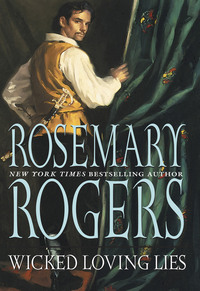Kitab fayl olaraq yüklənə bilməz, yalnız mobil tətbiq və ya onlayn olaraq veb saytımızda oxuna bilər.
Kitabı oxu: «Wicked Loving Lies»
Her golden eyes stared mesmerized into his sleepy gray ones with dark pupils that seemed to contract as recognition flared in them.
“You!” Suddenly he held her pinned down by the shoulders, his face staring down into hers. “How did you contrive it? Did you put one of your gypsy spells on poor Donald and my ship, as well? No wonder we’ve had such a bad voyage—a woman aboard ship always brings bad luck! What are you doing here?”
There was a cruel, dangerous look on his face, and sheer desperation made Marisa shout back at him.
“You—you threw me in here last night! And if I’m such bad luck, why don’t you just throw me overboard and have done with it? You’re such a rotten bully, no wonder all your men are so afraid of you! Well, I’m not. You can’t do anything worse to me than you have already—”
She was appalled at her own boldness.
He shook her, his fingers digging in to her bare shoulders.
“Don’t be too sure of that,” he muttered.
“This is exactly what her many fans crave, and Rogers serves it up with a polished flair.”
—Booklist on A Reckless Encounter
Also available from MIRA Books and ROSEMARY ROGERS
A RECKLESS ENCOUNTER
SWEET SAVAGE LOVE
SAVAGE DESIRE
Wicked Loving Lies
Rosemary Rogers
To Bet with love
CONTENTS
PROLOGUE
PART ONE: A WALLED GARDEN
CHAPTER 1
CHAPTER 2
CHAPTER 3
CHAPTER 4
CHAPTER 5
CHAPTER 6
CHAPTER 7
CHAPTER 8
CHAPTER 9
CHAPTER 10
CHAPTER 11
CHAPTER 12
CHAPTER 13
CHAPTER 14
CHAPTER 15
CHAPTER 16
CHAPTER 17
CHAPTER 18
PART TWO: DARK NIGHT OF THE SOUL
CHAPTER 19
CHAPTER 20
CHAPTER 21
CHAPTER 22
CHAPTER 23
CHAPTER 24
CHAPTER 25
CHAPTER 26
CHAPTER 27
CHAPTER 28
CHAPTER 29
CHAPTER 30
CHAPTER 31
CHAPTER 32
PART THREE: THE PERFUMED DAYS
CHAPTER 33
CHAPTER 34
CHAPTER 35
CHAPTER 36
CHAPTER 37
CHAPTER 38
CHAPTER 39
CHAPTER 40
CHAPTER 41
CHAPTER 42
CHAPTER 43
CHAPTER 44
CHAPTER 45
PART FOUR: THE SURGING TORRENT
CHAPTER 46
CHAPTER 47
CHAPTER 48
CHAPTER 49
CHAPTER 50
CHAPTER 51
CHAPTER 52
CHAPTER 53
CHAPTER 54
PART FIVE: THE ANGER AND THE PASSION
CHAPTER 55
CHAPTER 56
CHAPTER 57
CHAPTER 58
CHAPTER 59
CHAPTER 60
CHAPTER 61
EPILOGUE
CHAPTER 62
PROLOGUE
The Rebels
As soon as the light began to fade, the mist crept in from the forest that bounded the far end of the great park. It was just as if it had lain hidden there crouched among the densely growing trees until the approach of nightfall sent it moving towards the huge house that dominated a rise in the gently sloping ground—sending long, exploratory grey streamers out at first to curl insidiously around the stone walls; and then, growing bolder, advancing like a gauzy cloud until soon the forest was quite cut off from view, and there was only the grey-white mass pressing against the windowpanes. It almost seemed to be waiting—angry because it could not penetrate stone and glass and wood, but patient, too….
Mrs. Sitwell hurried to pull the heavy velvet drapes together, shivering as she did so despite a roaring fire in the fireplace.
“Never did like the country very much! It’s almost like it was too quiet, you know? And then the fogs here—ain’t like the London fogs—at least you can see the street lights shining, all yellow and cheerful-like. But out here—” She lowered her voice as she glanced towards the vast, canopied bed that stood in one corner of the room. “Tell me, Mrs. Parsons, how is it that he—” a jerk of her head “—His Grace, I mean—well, it just don’t seem natural for him to be down there in his study, writing letters, with his own wife dying up here.”
Mrs. Parsons’s thin lips seemed to disappear into her seamed face as she pursed them. “His Grace has his own ways—and his own reasons. You couldn’t know, of course, you’ve only been here three weeks. But I could tell you—” The woman hesitated for a moment, her fingers tightening over themselves; but then, as the desire to talk to someone after all the lonely months proved too much for her, she burst out, “I could tell you—it’s a great deal stranger, all this, than anyone could guess! And of course I’ve been with the family—His Grace’s family that is—for years. I was here when he brought her here as his bride, and I was still here when he brought her back from the Americas. I could have told, even when I was a mere slip of a girl myself, that there was something wrong….”
The woman who lay so still in the depths of the big, dark bed heard them whispering by the fire. Over the sound of her own breathing—each breath more difficult to draw than the last—she heard words:
“Brought her here from Ireland, he did. He was only Lord Leo then, and no one ever dreaming he’d ever come into the title like he did….”
She was in that half-world that lies between coma and reality, and when she heard the woman say something about Ireland, her mind slipped back easily through time; reliving the beginning was so much more pleasant than waiting for the end. Whirling pictures slid through her mind, some of them all too clear, others seeming to curl and blur about the edges like old letters.
Ireland, and her girlhood, when no one had called her Lady Margaret or Your Grace. It had been Peggy or Peg then. Pretty Peggy, the young men had named her, bringing blushes to her cheeks. And after all, in spite of what all Irishmen referred to as “the troubles,” life had not been too unpleasant.
What did anything matter as long as she was young and pretty with all of her life still stretching endlessly and excitingly ahead of her? Even her brother Conal’s frowns and carping didn’t matter too much as long as she could escape from him to go down to the village for her stolen, secret confessions to Father MacManus or to visit some of her father’s old tenants. Things were different since her father, the earl of Morey, had taken sick and finally died—without, thankfully, knowing what Conal had done to keep the lands for himself. Turned Protestant, renouncing his own true faith—how could he?
“I have to think of myself now—don’t you see that? And of you too, sister, although you do not seem to appreciate that fact. Catholics cannot inherit land. Would you rather see all that is ours and has been ours for generations pass to the English Crown? Someone has to be sensible!”
And she tried not to dwell on the fact that Conal took to going up to Dublin Castle, the seat of the English Government in Ireland, spending far too much time with the English officers who were their age-old enemies and oppressors. She hated the English! They were cold, cruel and arrogant, and they acted as if they owned even the lush green Irish earth they walked on. Conal’s mother had been English, which perhaps accounted for his predilection for that hated race, but her mother had been French—a pretty, small, dark-haired woman who had always smelled faintly of lavender or verbena water.
Peggy had been thinking of her mother that afternoon when Conal surprised her crossing the brook barefoot, her faded skirts kilted up around her calves.
Why couldn’t maman have lived? It was lonely, sometimes , without another woman to talk to, with only the sound of the chill to keep her company at night. If only—
Conal’s harsh, angry voice had cut rudely across her thoughts then.
“It seems I must forever be apologizing for my little sister! You see, my lord, she lacks not only discipline but also the care of a gently bred woman to instruct her in the manners and deportment of a lady.”
And looking up, with her face flushed with embarrassment, she had encountered those pale blue eyes for the first time. Eyes set deeply under blond brows in a face of chiseled perfection that was almost too beautiful to belong to a man.
“No use trying to run off like some startled wood-nymph, sister. We’ve caught you.”
The young Englishman’s arm, thrown in comradely fashion about her brother’s broad shoulders, dropped as he stared at her measuringly.
“Leo, may I present my sister, Lady Margaret Galvan? Lord Leofric Sinclair.”
Two months later, she and Leo had been married. And within three months, she had left Ireland, never to return to it again.
Her shallow breathing quickened as the shell of the woman who had once been “Pretty Peggy” moved one thin, bloodless hand as if to ward off memories that now came thick and fast, flooding her tired mind with scenes that, like watercolors, ran one into the other: Conal’s loud, blustering voice, shouting at her, threatening her; the feel of his heavy hands as he beat her into shivering, resigned submission; Leo’s white, soft hands, the heavy rings glinting on long fingers—his voice thick with the liquor he had consumed so heavily before he could bring himself to come to her; she herself lying trembling in bed, her thin lawn nightshift feeling clammy against her perspiring, shrinking flesh.
How long—how many months (or had it been years?)—before she was woman enough to understand that their relationship was not a normal one?
Fashionable husbands and wives did not seek each other’s company too much. And if she slept alone more often than not, this, too, was nothing out of the ordinary.
She had no one to talk to—no older woman to warn her or give her advice as to what she should expect from marriage. All Conal had said, gruffly, was, “You remember your promise to obey your husband and to submit to him in everything. That’s all you need to know, little sister.” And he and Leo had exchanged a look over her head that she hadn’t understood—not then.
After they had left Ireland, Peggy’s life was too full of new things, and far too confusing, for her to want to think too closely about her sudden marriage and the cold, remote man who was her husband.
There was the big house in the country near Cornwall where Leo took her first, to meet his family. His father, the duke of Royse, was an ailing, irascible old man, who had merely raised one bushy eyebrow as he nodded and growled, “That’s right—and high time, too! Told you marriage was the only thing.”
Leo’s older brother, the Viscount Stanbury, was off in Europe somewhere, but his younger brother, Anthony, was kind to her, shaking her hand vigorously as he stammered his good wishes.
After Cornwall, they traveled about a great deal so that she was always tired. Visits to relatives and friends and Leo leaving her alone with them most of the time. Finally, the months in London—a giddy whirl of fittings for dazzling new gowns and one activity after another until she felt that she never got enough sleep and was relieved that Leo left her alone so much. Leo’s sister, Lady Hester Beaumont, took her everywhere and saw that she met everyone and wore exactly the right clothes and jewels for every occasion. They had the use of the duke’s magnificent house in London, and Peggy learned to keep household accounts and manage a large staff of servants.
But she had barely had time to become used to the routine of life in London when they were on the move again, this time a journey that meant crossing the ocean, for Leo’s father had deeded him a large plantation in the colony of North Carolina, in America.
Leo was handsomer than ever in those days despite the faint lines of dissipation that were beginning to show in his face. Peggy had grown used to the fact that he was always cold and punctiliously formal to her. She was aware that there were other women who looked at her enviously and whispered that she had one of the few faithful husbands in town. But they could not know that her husband found her so unattractive that he seldom came to her, and then only when he was very drunk; or that he had never once undressed her completely, but fumbled clumsily and hurtfully for her body in the dark as if he could not bear to look upon her face or her nakedness. She had no idea what was supposed to take place between a man and a woman; and when he cursed and swore and hurt her with his groping fumblings, she blamed herself for being inexperienced. Leo was such a perfect, beautiful specimen of a man that the fault had to lie with her. The fact that he preferred the company of his cronies she also accepted passively. It was not until much, much later that she really understood what kind of devils drove her husband and the kind of debauchery his twisted nature craved….
In Carolina, Leo had his duties with the army that kept him away for weeks and months at a time. There was an overseer to tend the crops, and slaves to perform every task that needed doing, even to the brushing of Peggy’s long dark hair. She began to read, from sheer loneliness and boredom at first, choosing books at random and with a kind of diffidence (how limited her formal education had been) from the enormous library. And then, caught up and taken beyond herself by the sudden treasure-trove of knowledge that lay at her fingertips, she began to read quite avidly. Books on art, on history, on philosophy and even music opened a whole new world to her starved, seeking mind. She was never lonely now, with her secret world to retire to; and with some of her earlier agonizing shyness and anxiety disappearing, she began to make friends with the families of neighboring plantation owners, finding that making conversation was not so difficult after all if one had something to talk about.
Leo, when he was home, expressed himself pleased at her emergence from her “dull little shell,” and Peggy herself, as she became used to the lazy, leisurely life, was almost content.
Until…
She was to agonize over it later. To ask herself over and over if it had been worth it, being brought to sudden awareness of her womanhood and deeply hidden passions only to have everything taken away from her again. She could never even regain that fleeting sense of contentment that had come with her very ignorance of what living meant.
But at first, when it happened, she felt only stark, unreasoning terror, and a sense of unreality that kept her alive for she did not fall into screaming hysterics or try to flee in useless panic as some of the other women did, to be brought down bleeding and staring-eyed, her skull split open by a tomahawk.
To be taken by Indians! Such a thing only happened to other people—to the wives and families of small settlers—not to her, not to the Lady Margaret Sinclair, chatelaine of one of the largest plantations in the Carolinas.
“Leo will tell me it was all my own fault,” she caught herself thinking stupidly once during the long, forced march that led her and the other captives deeper and deeper into impenetrable forest and swamps. “If I had not felt it my duty to visit that poor little Mrs. Rutherford because she was having her first child and I thought there was no other woman for miles around. And then, after all, there were, and I need not have—”
But what was the point of thinking? After a while she concentrated only upon keeping on her feet, for if she fell she would be killed, and she had found, already, that she did not want to die.
Thankfully, her memory blurred—a series of pictures moving faster and faster in her tired mind until abruptly they stopped, focusing on one particular scene, growing brighter and larger, until all she could see was Jean’s face, as she had seen it first.
Dark-haired like herself, his eyes were a strange green-grey, like the surface of a lake on a cloudy day. Surprisingly, he had spoken to her first in French.
“Sacre—” And then, biting the next word off with an effort, “What were you doing among those unfortunate wretches? Had no one warned you of the dangers you might encounter?”
She was too tired, too numb to respond to his anger, except to wonder dully why he seemed so angry. She said the very first thing that came into her mind.
“You—you are not one of them! But who are you?”
“Nom de Dieu! Questions! And it is I who should be asking them. Do you realize in what kind of position you are, madame?”
“I am safe now, though, am I not?” Again she spoke without conscious thought, mesmerized by the angry, intent look in those ice-bright eyes.
Even as she spoke his eyes seemed to change, and something made her start to blush, even though she still could not tear her gaze from his sun-dark face.
“I am blood brother to the Iroquois,” he said. And then, more softly, almost to himself, he added, “Safe? My soul is as wild as theirs. I would not be too sure of it, madame.”
She found out later that she had been a gift from the Shoshone to their Iroquois brother. But by then it did not matter, for he had made her his, in more ways than one.
The women whispered by the fire, never noticing when the shallow breathing came faster, and more convulsively and finally stopped. Their conversation had followed the same pattern as Lady Margaret’s thoughts.
“But what happened then? I mean, it wasn’t hardly the poor creature’s fault, was it? Being carried off by savages and all—”
“It wasn’t that! And mind you, you promised not to tell another living soul! No, he took her back, all right, my lord did—paid a princely sum of money for her return, too. And then, just nine months later, the boy was born. You mind how my lord must have felt? Never being quite certain….” But the boy had his name, and she had the bringing up of him. Let him run wild, too, going off to hunt with the Indians and even live with them for weeks on end.”
“But Lord Leo? His Grace, I mean. Surely he—”
“Ah, but he had his duties with the army, you see. And surely you can understand his feelings about the lad? Those were trying times there with riots, and hotheads preaching all kinds of crazy ideas about self-government and all. And you know what it all came to in the end! Revolution. And Lady Margaret, a British Tory’s wife, entertaining the army officers and their Tory friends in their home—when all the time, she was a spy for them, for those rebels! Yes, and her son, too—for all that he was a mere lad at the time. Only ten or eleven he was, but he would carry them messages. It all came out in the end, of course.”
“I never!” Nurse Sitwell breathed the words, licking her lips almost hungrily.
“Oh, it would have been a rare scandal, I assure you, if Lord Leo’s father—my lord was the Viscount Stanbury by then for his older brother died in Italy of some fever—well, the duke hushed it all up, and only the family knew the whole story.”
“The Frenchman. He—?”
“Ah, that one! It’s my guess she’d have stayed with him or run off with him after he’d got the ransom money if he hadn’t had a wife and family of his own somewhere. But he came back when they had the revolution. I heard them say she hid him when he was wounded and the soldiers were looking for him everywhere. And that was how it started up again. Him and her and the spying. But Lord Leo caught on when the boy was captured along with some other rebels. And then, of course, to save him, she came back to England, meek as you please; and the family put it about she was suffering from some nervous disorder.”
“But you mean she wasn’t really touched in the head then? She—”
As if suddenly aware that she had said too much, Mrs. Parsons pursed her thin lips.
“Don’t you be saying anything like that. She couldn’t have been right in the head at the beginning to do what she done, and well you know it! Those Irish. They say she was a papist, too, and never really changed, although she pretended to, just to get herself married to a catch like Lord Leo.” She added darkly, “And I’ve no doubt that son of hers is going the same way, living up in Ireland all these years! He was incorrigible like one of them savages, and well I remember! They wouldn’t keep him in Eton, and when my lord found him a tutor here for him and Mr. Philip, his nephew, why—one day he almost killed Mr. Philip with his bare hands! And only because Mr. Philip teased him about being a colonial. It took Mr. Grimes and two of the footmen to drag him off. And after that my lord sent him off to live with his uncle in Ireland. Said he didn’t want to set eyes on Master Dominic again, and I can’t blame him! It’s been years now, and no one’s seen or heard of him—and a good thing, too, if you want my opinion. I doubt that he’s changed and I used to be frightened to be around him even when he wasn’t no more than a boy. Those eyes of his, like grey ice, fair startling they were, taken with his black hair—”
Mrs. Sitwell said suddenly and surprisingly, “Well, but all the same I cannot help feeling sorry for the poor lady. Fancy not setting eyes on your own flesh and blood for years and years, and not knowing what kind of a man he’s grown into! He’d be the Viscount Stanbury now, I take it?”
Mrs. Parsons frowned.
“That’s right. And the more’s the pity, for the title ought to be Mr. Philip’s by rights. And I’ve heard even His Grace say so! Ah, now there’s a handsome, charming young gentleman if there ever was one. You’ll see for yourself, I’m sure. But mind you—not a word of what I’ve been telling you. Family secrets—”
“Ah, well, I’ve heard a great deal of those in all the years I’ve been a nurse,” Mrs. Sitwell said comfortably. “And the reason Dr. Elphinstone recommends me to all the lords and ladies that are his patients is that he knows I can hold my tongue.”
Settling deeper into her chair, she encouraged Mrs. Parsons to go on with her reminiscing.
The duke of Royse was also remembering, the old, implacable rage hardening his still handsome features.
Damn it, why did the bitch take so long to die? Why had he let his passing lust for Conal make him choose his sister for a bride? Shy, innocent Peggy, with her great, wondering eyes. Demure Lady Margaret, who would never question nor make any demands of him. And to think that for years he had congratulated himself on his choice of a wife. She was stupid and country-bred, and slim-flanked and small-bosomed enough so as not to disgust him too much when he forced himself to go to her.
“Take a wife, dammit! I’ll not have any ugly scandal attached to our name!” his father had warned him after the episode with a certain young groom. And so he had gone to Ireland and met Conal, and through Conal, his black-haired sister.
“If I had not let her taunt me—if I had not been so damned blind drunk and angry that night….”
But he’d had to teach her a lesson, to make her remember who she was and who he was. That bold-faced little strumpet sitting up in bed without a stitch to cover her as she said softly and innocently, “But Leo, I’ve become used to sleeping naked. The Indians wear very little, you know.”
Instead of being grateful and relieved that he had ransomed her and taken her back, she had spent most of her time crying or mooning around with swollen eyes. She’d tricked him, curse her, damn her! And all the punishment he’d inflicted on her since then could not wipe that out.
After he’d left her that night, bruised and bleeding from the force of his assault on her body, he thought he had cowed her forever. And then, a scant month later, she had announced to him quite calmly across the breakfast table, “I think you’ll be happy to know, my lord, that I am expecting a child.” Then, as he half rose, she must have read the ugly resolve in his eyes for she continued in the same even voice, “I could not bear not to confide our happy news to Mrs. Gordon and some of the other ladies whose husbands are your closest friends. They all wish us well, of course.”
At least the child she bore was no progeny of an Indian savage—but he could not be thankful for that; for if it had been, he would have had the excuse and a reason to strangle it. No, she had produced a grey-eyed, black-haired brat who looked like her and might, by the slimmest margin of possibility, be his. And she had never, no matter how he threatened or bullied her, confessed to having been the mistress of that half-French American, even after he came back into her life.
“Why does she cling to her miserable existence? By God, that fool of a doctor said it would be only a matter of hours.” And then on the heels of his wish he received its fulfillment with the panted cries of the women upstairs and the scurrying of feet.
For the first time that evening the duke smiled and leaned back in his padded velvet chair. So it was over at last! He had everything prepared—all the necessary papers drawn up and signed and the doctor on his way. If all went well, he would be back in London by morning—no need to spend another night in the country with a corpse and whispering servants for company.
“Well, Leo? ’Pon my soul! I’d hardly expected to find you back in town so soon, after—” Lord Anthony Sinclair, Baron Lydon, let his words trail away into an awkward cough as he lowered his ponderous bulk into the padded leather chair next to his brother in the Select Room at Whites Club.
The duke raised an eyebrow as he studied Lord Anthony’s red, perspiring face.
“Indeed, Tony? I would have thought that you of all people would be the least surprised to find me back in town.” A certain dryness crept into his voice. “Well? Did you tear yourself away from Prinny’s company merely to offer me your condolences?”
Lord Anthony cleared his throat, shifting uncomfortably in his chair.
“Dammit, Leo! Why will you always put a man so deucedly ill at ease? To tell the truth, I had half-expected to discover you here tonight. Saves me a trip into the country, y’know, although I daresay, with the funeral—”
“The funeral, my dear brother, took place very quietly this morning as you very well know. And, to forestall any further questions on the matter, I did not feel the need to be present. So, now that that is out of the way perhaps you will put me out of my suspense and tell me why you found it necessary to come looking for me.”
“Last thing I wanted to do, actually!” Lord Anthony confessed with a sudden burst of frankness. “Why does everything have to happen all at once, eh? But dash it, there was no one else to be the one to tell you, and you know the Prince of Wales thinks a great deal of you—reminded me that you have Chatham’s ear—”
Languidly, the duke raised one white, be-ringed hand, causing his brother’s words to stumble into silence.
“Peace, my dear brother, peace! I am afraid that I can make no sense at all of whatever you’re trying to convey to me. I presume you did come here to bring me bad news of some kind? Well, I have found that news of any sort is best delivered quite directly without any frills or evasions.” He paused deliberately to take a pinch of snuff and heard his brother sigh heavily.
“You’re a devilish cold fish, Leo. Damned if you aren’t. Never quite understood—but very well then, no need to give me that cold-eyed stare, I’ll come directly to the point. It’s your—it’s Dominic.”
This time he thought he saw a reaction in the duke’s cold, composed face, a certain strange gleam in his eyes, making them grow suddenly more brilliant for an instant. But the next moment, the duke had raised one eyebrow as he said calmly, “Indeed? But now you have truly surprised me, Tony. I was told some months ago that the young man had suddenly decided to take off for France in spite of the somewhat turbulent turn of events there. So? What of him?”
This time Lord Anthony was quite blunt, his face flushing.
“He’s here. In England. In Newgate Prison, to be exact, facing a charge of treason along with five other Irish rebels. And if you can’t do something about it, Leo, there’s going to be the very devil of an ugly scandal when he comes up for trial within the next fortnight.”
The duke’s snuffbox closed with a snap—his only show of emotion. He said softly, “So? And do they know who he is? Has anything been noised abroad yet?”
“He would have been summarily executed after a public flogging, along with some ten or fifteen others, if not for the intervention of a certain Lord Edward Fitzgerald, who informed the major in charge that the man known as ‘Captain Challenger’ was none other than the Viscount Stanbury and the heir to an English dukedom. Damn it, Leo—no need to look at me that way, I can’t help the way matters turned out! Fortunately, this Major Sirr proved to be an exceptionally intelligent and discreet man. He had five of the rebel leaders sent here to Newgate, under heavy guard, of course. And they’ve been permitted to speak to no one, not even to the prison doctor. No exercising in the prison yard, and their meals are pushed in to them through a grating under the door—”
“You may spare me the trivial details, Tony, and relate to me only the facts, if you please.”









